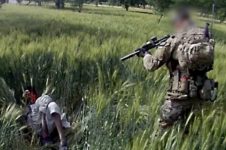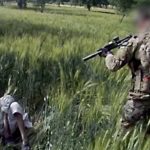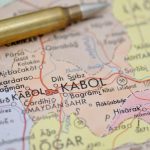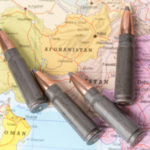“Straight-Up Execution”: Australian War Crimes Exposed in Afghanistan

“You want me to drop this cunt,” asks the Australian SAS soldier as he stands above a defenceless Afghan man. Referred to as Soldier C, the special forces officer is seen pointing his assault rifle at close range at Dad Mohammad, who’s lying on his back, curled up on the ground with his hands up.
The nearby dog handler, who’s canine located Mohammad, answers, “I don’t know, mate.” He then suggests Soldier C asks the patrol commander. So, C twice calls out to his boss as to whether he should kill the unarmed “cunt”, but the commander’s answer is inaudible.
Seconds later, the footage then captures the sound of Soldier C firing three shots into the married father-of-two laying in a field somewhere in Uruzgan province in Afghanistan.
A subsequent Australian Defence Force (ADF) investigation determined that the May 2012 killing was lawful. Soldier C told ADF investigators that the man had been killed because he had a radio. And he also claimed to have shot the young man from a distance of about 15 to 20 metres.
However, the footage of the incident – which aired last Monday during the ABC Four Corners report Killing Field – paints a very different picture to that of the SAS soldier, who was still serving earlier this week.
And as lead investigator Mark Willacy said, the program further laid bare the “culture of impunity” operating within Australian special forces.
From defence
Following the airing of the footage, the Australian Department of Defence posted a statement on Thursday in response. And the department described the content of the report as “serious and disturbing”.
“The Australian Army soldier referred to as ‘Soldier C’ in the Four Corners program has today been identified and suspended from duty,” the press release reads.
However, it makes no mention of another officer who had some serious allegations made against him during the program. This second soldier is evidently still serving in the ADF.
Defence went on to underscore that the ADF conducts operations “under strict rules of engagement and promotes a culture of ethical and lawful behaviour”. And it added that these “rules and norms” are in accordance with both Australian and international law.
The statement also made mention of the current Inspector-General of the Australian Defence Force inquiry into alleged war crimes perpetrated by Australian special forces personnel in Afghanistan between 2005 and 2016.
The secret military probe has been in operation since May 2016. Headed by former NSW Supreme Court Justice Paul Brereton, the inquiry – which has been investigating 55 alleged war crime incidents – is now close to delivering its final report.
A special forces whistleblower
Braden Chapman is a former SAS signals intelligence officer, who was deployed with the 3 Squadron SAS in 2012. During the Killing Field report, Chapman relates three alleged incidents where Australian soldiers perpetrated acts that he labels murder.
It was only a few days after Chapman arrived in Uruzgan province that another longer serving soldier made him aware that at times troops weren’t necessarily operating within those rules of engagement.
In a somewhat prophetic statement, the other soldier told the rookie that he better be “ready and prepared”, as Chapman needed to ensure that he’d be okay with the old timer “putting a gun to someone’s head and pulling the trigger”.
The more experienced soldier said that he didn’t want to read about it in the press ten years into the future.
The former SAS signals intelligence officer went on to tell the ABC that destroying people’s homes and infrastructure, blowing up private cars and shooting dogs were regular occurrences. And he added that the Taliban, as their opposition, usually weren’t doing the same.
Chapman asserts that planting radios and weapons on bodies to justify killings was a regular practice. He further recalled the blatant execution of a prisoner, the murder of another man standing with his hands up, as well as another incident regarding an elderly man beaten to death.
Although, the Four Corners report also reveals that not all SAS troops were okay with the random killings of unarmed civilians and soldiers, as footage shows some officers discussing how uncomfortable they actually were with these transgressions.
And the ABC also played Chapman the video of the killing of the unarmed father in the field for the first time. The whistleblower said he hadn’t been aware of the incident, but he recognised the man pulling the trigger. And he made certain that he thought it was “a straight-up execution”.
For exposing the truth
Of course, this is not the first time the ABC has revealed alleged Australian war crimes in Afghanistan. In July 2017, it published the Afghan Files report, which consisted of the details of classified military documents leaked by former ADF lawyer David McBride.
These documents contained accounts of Australian defence personnel carrying out similar incidents to what was exposed on Monday. These included the killing of unarmed civilians, some of whom were children. And it was this report that led the AFP to raid the ABC Sydney offices in 2019.
McBride told Sydney Criminal Lawyers in June last year that Australian special forces “weren’t following the law”, but rather they were simply trying to “look good”. “There was no plan, or anything that actually worked,” he continued. “Everything was done for appearance.”
The lawyer is now facing five national security-related charges, which will be heard this year in a closed trial. And McBride states that he wasn’t happy with the ABC report as it focused on the troops, while he wanted to expose their being abandoned by ADF management and politicians.
Any life will suffice
The Killing Field also documents another 2012 incident, which involved the ABC gathering evidence in Afghanistan. It saw 2 regiment SAS personnel searching villages for a “rogue Afghan soldier” who’d killed three Australian troops, when two squadrons entered the village of Sola in Uruzgan.
Four Corners spoke to Sola villager Rafiullah, who, as a boy of eight at the time, was praying in the mosque with his father, the local imam. He recalled that the Australians entered the building and began beating him and his father, along with tying up the other villagers.
“A soldier was waiting at that corner and he shot my brother in the mouth from a distance,” Mohammad Qasim, another son of the imam explained. “My father was shot with one bullet in the side of the head, and another in the side of his body.”
The corpse of Qasim’s brother was found by villagers later that night after the Australian troops had left. His father’s body was found in the morning. He’d been shot amongst some fig trees.







